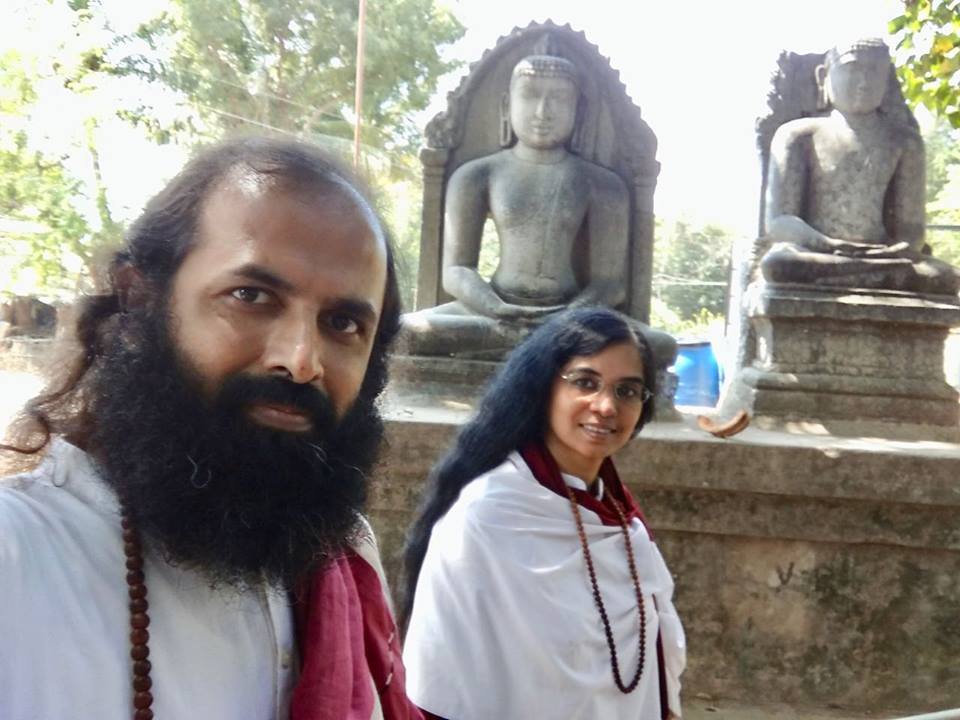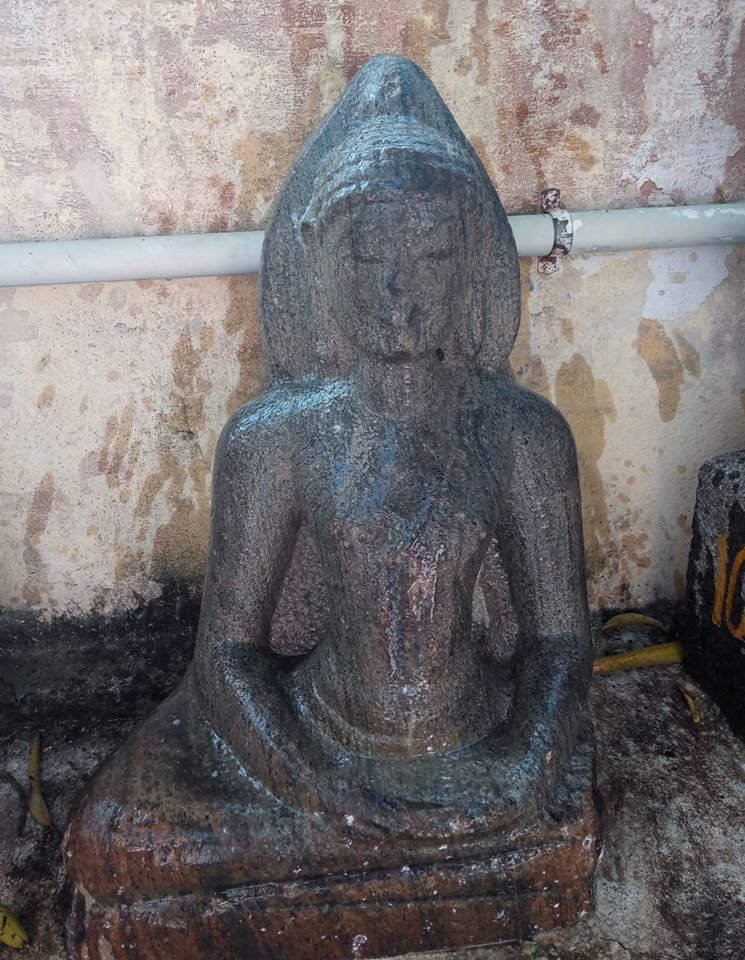Buddhism in Ariyalur – a Land of Ancient Viharas

The abundance of ancient Buddha statues found in the Ariyalur district of Tamil Nadu indicates that it was a prominent centre of Buddhism in the last millennium. The name of the place itself has a strong Buddhist connection. Though it is not a well-known fact, the etymology of ‘Ariyalur’ can be seen as Ariyal (அறியல் Learning/knowing) + Ooru (Place), i.e., ‘the place of learning’, a clear reference to the presence of Buddhist learning centers in this area in the past. It is also interesting that Arivor – ‘people of wisdom’ – was an epithet used in Tamil Nadu for the Buddhist sangha.
In Ariyalur, we came across many Buddha and Bodhisattva statues very much in line with the place name. Eight Buddha statues were found from various parts of Ariyalur. We also came across a Bodhisattva statue that is yet to be unearthed and a female deity holding vajra and lotus. From the statues, it can be inferred that Mahayana Buddhism (and probably Vajrayana) was active in Ariyalur from the 11th Century CE onwards.
It is an interesting fact that Gangaikonda Cholapuram in Jayankondam, Ariyalur district was developed as the capital of the Cholas by 1025CE. Buddhism also became active in Ariyalur around the same time. This indicates that even Rajendra Chola I who was staunch Saivite continued to support Buddhism.
Jayankondan Pazhuppar (பழுப்பர்)

The Buddha statue present in Jayankondam town in Tamil Nadu has many interesting accounts about it. This statue is known among the locals as Pazhuppar. It means ‘the one who has ripened’ (Or ‘the one who ripens others’?). Though ‘pazhuppar’ itself is not a well-known epithet for the Buddha, its meaning captures what a Buddha is – the one who has perfected the accumulation of merit and wisdom, cleared the two obscurations – cognitive and emotional, and thus ripened. Thus Pazhuppar, in its former meaning, is Buddha, the one who is ripe to leave the cyclical existence of Samsara into the pure bliss and wisdom of Nirvana. Even more appropriately, Pazhuppar, in its second possible meaning, is the Buddha as the one who ripens others through his teachings and guidance. Even though there is no active Buddhism in Ariyalur now, this rare name for the Buddha seems to have passed down through generations. The continuity of the rare name also indicates that this Buddha statue was never lost in between. Most likely, it just stayed right on that spot from the time of the old monastery.

This statue is also very unique in its sculpting. There is a prabha (halo) around the head, and then above that, there is the carving of a Bodhi-tree with a chathra (umbrella) in front of that. Archeologists [Ref 1] claim that the style of the umbrella is similar to the design in the copper plate grants of Rajendra Chola I, and hence they estimate this statue to be from the second half of 11th Century CE.
This Buddha statue is now a protected monument of the Archeology Survey of India (ASI). It is located in the village behind the New Taluk Office, and close to a pond. The statue is 5ft in height.

Below the pedestal of the Buddha statue, there is another statue below the earth, with only the head visible outside. It is a Bodhisattva statue, most likely that of Avalokitesvara in his popular South Indian form with matted hair. Somehow, the archeologists have not paid attention to this stone and haven’t taken it out.
Another Buddha statue was also present in Jayankondam town earlier, but that was shifted to Pudukottai Museum in 1977. We are yet to see that.
Suthamalli

Another beautiful Buddha statue was found from Suthamalli village of the Ariyalur district of Tamil Nadu. This is currently kept in Chennai Museum, as a grand showpiece right at the entrance to the archeology section. Unlike many other museum pieces that we came across in Tamil Nadu, this one is showcased well with a nice background. This statue is from the 13th Century CE and is about 5ft in height.
Vikkiramangalam

Vikramangalam village in Ariyalur district, Tamil Nadu, has two beautiful Buddha statues in an ignored condition below a pipal tree by the roadside. One of the Buddhas is 5ft in height. According to archeologists, this is from the 13th Century. It has a prabha (halo) behind that originates from the two makaras (dragon heads) on the sides. The other Buddha statue is about 3ft in height. Its ushnisha is broken. Archeologists estimate this to be from the 12th to 13th Century period.

Unlike many other ancient Buddha statues on the roadside in Tamil Nadu, these two Buddha statues seem to be in an ignored condition (see another photo in the same post, for the view of surroundings). We learned that earlier archeologists tried to shift these statues to museum, but the villagers objected. Later, someone sponsored a pedestal and grill around the statues. However, that is broken now.
It would have been good if the archeology department protects this in a similar line as the Jayankondam Pazhuppar Buddha statue in Ariyalur.
Pillaipalayam

In a remote village called Pillaipalayam, around 5km from Gangaikondacholapuram (Ariyalur district), is a lake known as Pandiyan lake. We went there as we heard the news of a recently identified Buddha statue there. Driving from Gangaikondacholapuram through the country roads in the midst of vast fields, we reached the lakeshore in the middle of nowhere. There, right below a pipal tree (bodhi tree), we could see the broken Buddha statue and a few other statues.

Coming to the story of the Buddha statue:
Around 16 years back, when villagers were rebuilding the banks of the lake, they unearthed a broken piece of an ancient Buddha statue along with two Ganapathi statues. Although the villagers did not identify the statue as that of Buddha, they placed all the three statues under a peepal tree nearby and worshiped them. Later in the year 2019, researchers of Buddhism in Tamil Nadu, including Dr. B. Jambulingam, M Selvapandian, and K Ravikumar, identified the statue as the ‘Buddha’.
The Buddha statue is quite damaged and belongs to around the 10th-11th century. Only the upper part of the statue is unearthed. That is around 2.5 ft in height.
Elaiyur

Another Buddha statue is from Elaiyur village in Ariyalur district. This statue too is presently kept in the Chennai Museum. It is about 5ft in height. Archeologists estimate this to be from the 11th Century.
Ariyalur
A Buddha statue, presently preserved in Gangaikonda Cholapuram Museum, was originally from Ariyalur. According to Dr. B. Jambulingam, this statue was earlier in front of the District Collector’s Office at Ariyalur . He saw the statue there in 1999.

Keelakolathur
A Buddha statue from Keelakolathur village in Ariyalur district, Tamil Nadu, is presently in Gangaikonda Cholapuram Museum.

Also see Buddhism in Thanjavur and Kumbakonam in Ancient Days and Buddhism in Tiruchirappalli – Place of an Ancient Vihara for other places of Buddhist importance around Ariyalur.
References
- Putheri (Buddheri) – The Southern most Stupa of Ancient India - January 19, 2023
- History of Buddhism in Kerala - January 12, 2022
- Buddhism in Kallakurichi, Tamil Nadu - March 4, 2021


Great site.people like me who want to explore buddism , this one is a treasure trove.I appreciate your great efforts in unearthening the buddist influence in southern part of the country.My whole hearted wishes to you.
Thank you.
I have been studying Buddhist statues in Ariyalur district,You have not seen many Buddhist statues in Ariyalur district and near places.They have abducted many Buddha statues.The Buddha at Chetti thirukonam on the side of Vikramamangalam you studied Come and see the statue.
You come back to Ariyalur district.I have been practicing Buddhism.
K.SASIKUMAR,ADVOCATE
VANGARAM VILLAGE-AYAN THATHANUR POST
SENDURAI TK, ARIYALUR DISTRICT 621709
CELL;9443838328
Dear Adv. Sasikumar, Thank you for your response and for the information about Buddha statues of Ariyalur that we would have missed in our article. A few months back we visited again, and there was one more that we saw near Ayangudi near about 5km from Gangaikondacholapuram. We are yet to add that here. We will be glad to visit again and add any missing statues once the Corona situation eases. You can contact us directly at the contact information available at https://www.wayofbodhi.org/yogi-prabodha-jnana/
Regards,
Prabodha and Abhayadevi
Namo Buddhaya….
Buddhist great past of Tamilnadu
Great to hear about such ancient caves and statue of Lord Buddha. You are doing a good job by exploring lord Buddha place and spreading principles, disciplines across people. Please keep us updated related to such information.
I am from Maharashtra where no of caves called as Buddha lenis are present and protected by Buddhists people. Still new places are getting explored and people from Buddhists community trying to protect those. So incase of such info please create some youtube videos about your studies and exploration so we can spread it to most of people who believes in Buddhism. Namo Buddha.
I am writing in the blog entitled “Buddhism in the Chola country”, for nearly one decade. Our experiences during the field study and the relevant newspaper clippings can be found in the following link in Tamil பௌத்த சுவட்டைத் தேடி : பிள்ளைபாளையம், அரியலூர், September 01, 2019 : https://ponnibuddha.blogspot.com/2019/09/blog-post.html
Dear Jambulingam Sir,
Thankyou for your great efforts in finding and preserving Buddha statues in the Chola country. In many of the places in Tamil Nadu with Buddha statues that we visited, people were mentioning about you and your contributions in preserving those statues. In South Tamil Nadu (the erstwhile Pandya country), we saw many Bodhisattva statues, but not many Buddha statues. If you can extend your valuable efforts to South Tamil Nadu also, it will be very helpful for unravelling and preserving Buddhist heritage.
I will keep in mind your opinion. Thanks and Regards.
In the article it is said that there are Two Buddha statues from Keelakolathur village in Ariyalur district, Tamil Nadu, are presently in Gangaikonda Cholapuram Museum. It is not so.
Of the two Buddhas the first one is from Ariyalur and the second statue is from Keelakolathur. (I saw the first one, when it was in Ariyalur). Later it was shifted to the Museum. For more information visit my blog in the following link: https://ponnibuddha.blogspot.com/2014/12/blog-post.html
Dear Sir,
Thank you for your feedback. It was based on the information we got from the Gangaikonda Cholapuram Museum staff. Now, we have corrected it based on the details you provided. Thanks again, for the great work you are doing.
Regards,
Abhayadevi
Explore the sithanavasal cave in Pudukottai district in Tamil Nadu.